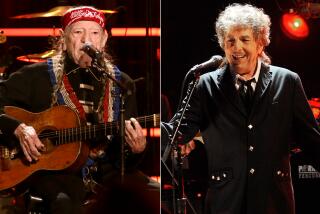JAZZ REVIEW : Headliners at Bowl Deliver Triple Treat
- Share via
The billing for Wednesday night’s concert was “Jazz at the Bowl.” But a more accurate title would have been “Blues at the Bowl.” With Joe Williams, Etta James and Lou Rawls as the headliners, there was never any doubt that the 14,323 listeners in attendance would hear a meticulous survey of the blues, in all shapes and sizes. And they did.
Williams led off with a classic collection of jazz-based blues. An elegant, smooth-voiced stylist whose rhythmic surge is deceptively powerful, he touched on most of his familiar numbers. Among the highlights: an unusual variation on “Every Day I Have the Blues,” sung with an accompaniment from Miles Davis’ “All Blues,” and a lovely reading of a rare non-blues, Artie Butler’s inspirational “Here’s to Life.”
James, one of the rare stars of ‘50s R&B; who has continued to have an evolving career, dominated the stage with the elan of a charismatic preacher. She sang songs that were essential to her early career--”At Last,” “Trust in Me” and “Sunday Kind of Love” among them. But she was at her best with a bitingly raw, emotionally complex interpretation of a somewhat lesser-known tune, “I’d Rather Go Blind.”
Making the most of his starring position in the performance, Rawls played his familiar suave-sophisticate role to the hilt. He looked good and sounded good, his rich and resonant baritone voice embracing everything from a Chicago shuffle to smooth, night music-style rhythm and blues.
An opening medley strung together two classic items--”Stormy Monday Blues” and “Going To Chicago”--with a typically humorous Rawls rap. He followed with such slickly contemporary numbers as “Lady Love,” “Natural Man” and his megahit, “You’ll Never Find Another Love Like Mine.” The carefully programmed, well-paced set climaxed with selections--”Fine Brown Frame” and “Hootchie Cootchie Man” among them--from Rawls’ new, jazz-tinged album on Blue Note, “At Last.”
At almost precisely 11 p.m., Rawls thanked his audience and left without an encore. It was a surprisingly abrupt ending to an evening otherwise bountifully overflowing with the joy and passion, the humor and sensuality of America’s most essential musical form.
More to Read
The biggest entertainment stories
Get our big stories about Hollywood, film, television, music, arts, culture and more right in your inbox as soon as they publish.
You may occasionally receive promotional content from the Los Angeles Times.







